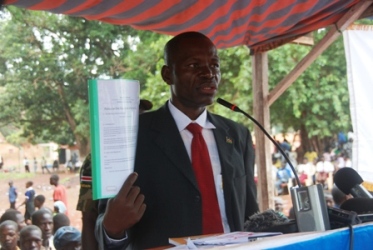W. Equatoria launches education and health year book
June 26, 2012 (JUBA) — South Sudan’s Western Equatoria state last week
witnessed the official launch of its long-awaited year book, with
education and health service provision emerging as key government
priorities for the population.

Joseph Bakosoro said access to health and education services are
fundamental rights of citizens, widely seen as key to attaining peace,
stability and social security in the country.
“This day has entered our calendar and will continue to be
commemorated as Western Equatoria State is witnessing a historical
event, which marks the good intention of the state government and the
expectation of the entire people of the State for better quality of
education, and health Service,” said Bakosoro, in a statement extended
to Sudan Tribune.
The existence of such a year book, he emphasized, will enable
government to plan and effectively allocate resources to the key
sectors, specifically citing the education and health service
provision, also outlined as the national government’s major
priorities.
This year, Western Equatoria, according to its governor has place
particular focus on education, after it emerged that many children of
school going are out of learning environment and reportedly became
beggars on streets.
“[Their] Parents do not care or monitor whether [these] children are
at school or not,” he said.
The decision to focus on education, Bakosoro reiterated, remains part
of government’s effort to fight high illiteracy rate and crimes, which
have reportedly become rampant in the state.
Meanwhile, limited learning spaces, in adequate numbers of trained
teachers, few reading materials, lack of a unified education
curriculum and financial constraints have been cited as bottles necks
to state’s efforts to enhance quality education and offer better
health services.
The recent South Sudan Household Survey report, launched by the
National Bureau of Statistics (NBS), placed Western Equatoria as the
region with the highest maternal and child mortality rate in South
Sudan.
While speaking at the same occasion, Joseph Ukel Abango, South Sudan’s
minister for general education hinted on the five year (2012-2017)
embedded within the Education Bill, which he seeks to address all the
challenges within the education sector.
“That strategic plan has five important goals; it was intended to
improve quality education meaning we are looking at unifying
curriculum that allows English to be the medium of instructions in
schools and we shall embark on intensive English course for students
from Khartoum,” said Ukel.
The minister, however, encouraged the state government to focus on the
formation of a parents’ council that will work together with the
school administration to enhance better education systems.
Plans are currently underway, according to the General Education
Minister, to form South Sudan Examination Council, mainly comprising
of retired teachers from all the 10 states of the country. The
council, will among other things, be tasked with setting national
examinations.
Also in the making, the minister added, is the proposal to develop a
code of conduct for teachers and employees, seeking to regulate
excessive drinking of alcohol among teachers and late arrivals in
schools.
On his part, Philip Michael Pia, Western Equatoria’s Minister for
General Education lauded the state government for placing education as
a key priority in the region, describing it a pillar for national
development.
Despite increase in primary school enrollment to 75,000 in 2011
alone, the state ministry has place particular emphasis on girl-child
education, quality education and provision of better services to
citizens.
(ST)
